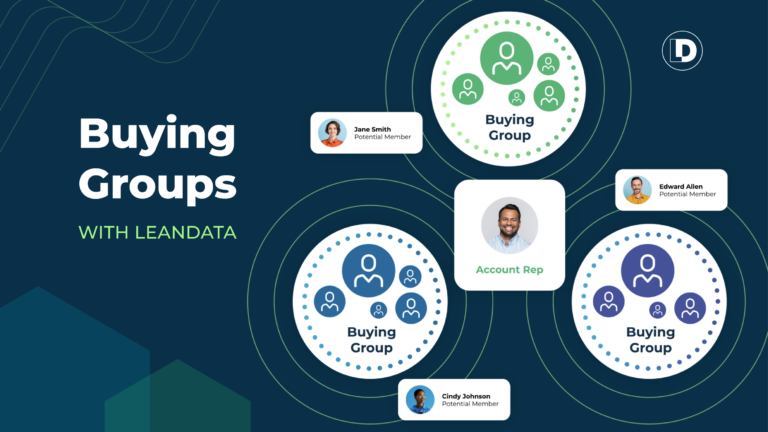Speed to lead tools optimize the time in which companies engage with potential customers.
Simply stated, speed to lead is the time it takes for a company to contact a lead after some sort of “moment,” like an ebook download, contact-us form or click on an online ad.
A good speed to lead tool will shorten an organization’s response time to mere minutes.
After all, the faster a lead is contacted, the more likely they are to convert into a paying customer.
Speed to Lead Tool Benefits
The best speed to lead tools will not only deliver FAST response times, they also have the power to:
- Improve lead management
- Automate routine tasks
- Provide lead tracking metrics to support iteration
Why B2B Companies Should Care About Speed to Lead
Today’s B2B buyers are deep into the consideration phase of their buying journeys before they ever engage with a seller.
So, once buyers take action, sellers have no time to waste. Buyers are ready to go, and they’ll seek solutions elsewhere if your lead response time is too long.
You’ll know your company is struggling with speed to lead if you experience:
- Low conversion rates
- Poor feedback from prospects stating they were contacted too late
- High lead drop-off rates
- Frustrated sales reps
- Inefficient lead management systems
- Lack of lead automation
- Poorly integrated CRM systems
- Inconsistent lead response times
So if you’re ready to invest in a speed to lead tool, here are the top 10 you should investigate:
#1 LeanData
LeanData is a best-in-class revenue orchestration platform native to Salesforce that improves speed to lead by capturing buyer engagement signals that trigger revenue plays.
When a prospect completes a demo request form, LeanData orchestration can, within seconds:
- Clean the data
- Qualify the prospect
- Offer a self-serve meeting scheduler
- Match the Lead to an Account
- Convert the Lead to a Contact
- Assign the Lead to a sales rep
- Send the sales rep a Slack notification
- Allow the sales rep to update Salesforce information in Slack
- Enroll the Contact in an Outreach sequence
- Attach the Contact to an Opportunity
And that’s just a fraction of the LeanData platform. Check out all the things you didn’t know LeanData could do.
Take a Tour
How LeanData Increases Speed to Lead
- Automated Lead-to-Account Matching: confidently matches buyer signals to other CRM records with 95% accuracy
- Data Management: prevents dirty data from impacting your CRM by putting data management practices like updating records, deduping, and more on autopilot
- Powerful Lead Routing: delivers the right lead to the right rep at the right time with options for Round Robin pools, capping, and territory-based assignment
- Integrations: LeanData has 17 integrations that will make your tech stack more efficient and flexible
- Flexible User Interface: uses a drag-and-drop interface to automatically assign and update Salesforce records in real time
- Automated SLA Tracking: manages sales productivity by automating SLA accountability
- Automated Alerts: delivers alerts full of rich context Slack, Microsoft Teams, or email and tell your team what steps to take next
- Automated Meeting Scheduling: streamlines your meeting scheduling processes with BookIt for Forms, BookIt Handoff and BookIt Links
Not surprisingly, more than 1,000 companies rely on LeanData to improve their speed to lead. In fact, LeanData has over 850 reviews on G2 with an average 4.6 rating.

LeanData Pricing
LeanData currently offers three main tiers for purchase: Standard ($39/user/month), Advanced ($49/user/month), and Premium ($59/user/month). BookIt for Forms and BookIt Handoff meeting scheduling tools are $25/per connected calendar/month.
Moreover, each pricing tier offers users a different set of features and functionality. The full list of features as well as plan comparisons are noted on the LeanData pricing page.
#2 Mixmax
Mixmax is a sales engagement platform that automates email and streamlines other sales-related tasks in order to connect with prospects in less time.
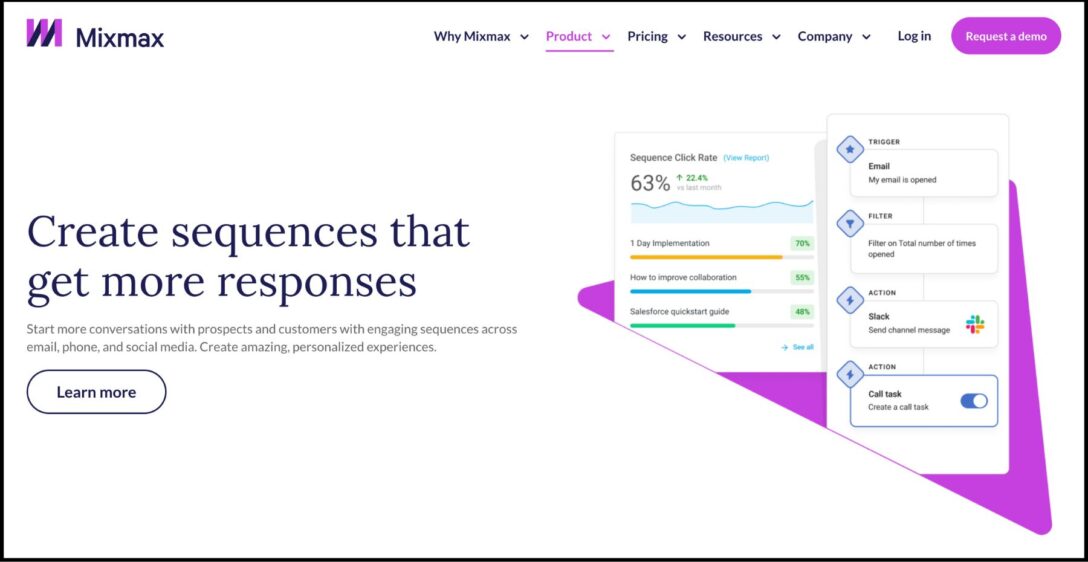
Main Features
- Custom email sequences
- Meeting scheduling automation
- AI writing assistant
- Salesforce integration
- Inbound lead routing
Mixmax Pricing
Mixmax offers four pricing plans: Enterprise (Custom pricing), Growth + CRM ($69/user/month), Growth ($65/user/month), SMB ($34/user/month). For teams under five people, Mixmax has calendaring and email tools available on a “Free Plan”
In addition, for some pricing tiers, Mixmax offers a 14-day free trial.
Pros
Mixmax has over 1,300 reviews on G2 with an average 4.6 rating. First, users report that Mixmax saves them time and allows them to be more productive. In addition, users note the platform is easy to use and implement. Mixmax users like the tool for email tracking. It helps them customize and schedule bulk emails.
Cons
Some users report that the email templates, buttons, and layout are confusing. Further, one user reported the UI was “overwhelming.” Others shared that the group event scheduling feature is difficult to navigate. Because Mixmax is integrated into users’ email accounts, some people have experienced disconnections and other bugs.
#3 Salesloft
Salesloft is a cloud-based, AI-powered sales engagement platform that helps sales teams perform selling tasks, communicate with buyers, and understand what to do next.
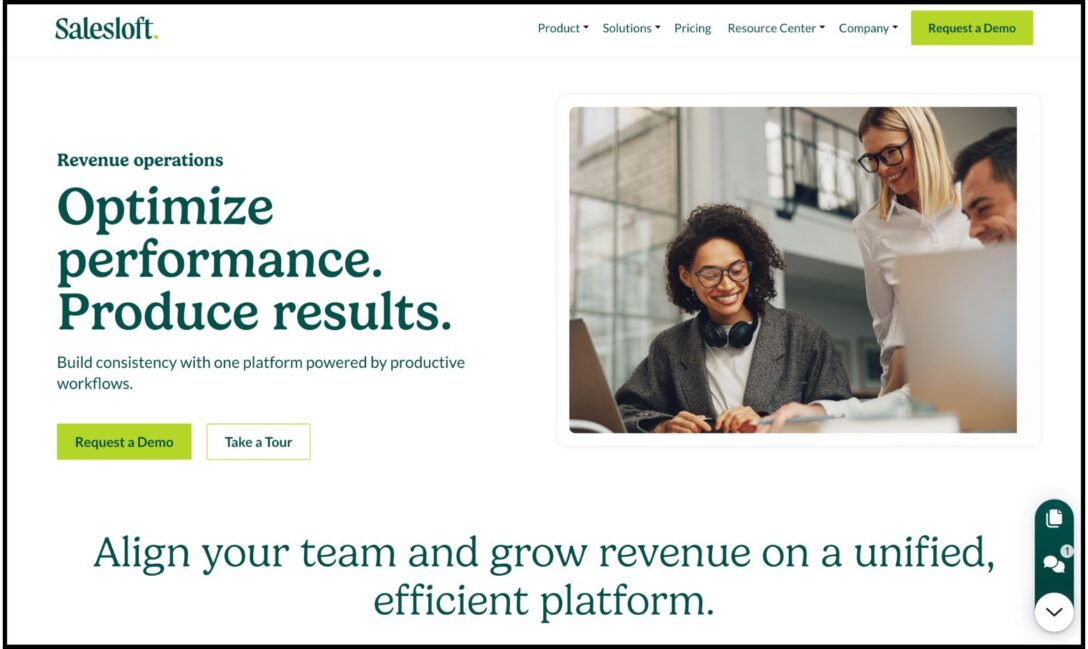
Main Features
- Sales prospecting tools
- Call recording and analytics (conversational intelligence)
- Deal health tracking and insights
- Sales forecasting
- Data integrations with CRMs
- Sales coaching
Salesloft Pricing
Salesloft offers three plans: Essentials, Advanced, and Premier. Unfortunately, there are detailed comparisons of each plan on their website, pricing details are gated. However, specific details and quotes are provided after a demo is booked.
Pros
Salesloft has over 3,800 reviews on G2 with an average 4.5 rating. Overall, users report positive experiences with the Salesloft team and implementation process. In addition, they like how Salesloft integrates with other tools in their tech stack. In fact, LeanData integrates with Salesloft and Salesloft Rhythm.
Cons
Negative reviews of Salesloft discuss difficulties with the UI (user interface) and UX (user experience). Some users find the automation rules limiting. They also mention that the Salesloft integration with Salesforce can be unreliable or easily disconnected.
#4 Rattle
Rattle is a RevOps tool that connects sales tech tools (Salesforce, Clari, Gong, etc) with sales engagement tools (Slack and Teams). So rather than requiring sales reps to update multiple sales platforms, Rattle uses automation to create a two-way workflow between sales tech and sales engagement.
Therefore, Rattle supports speed to lead by automating processes that can help close deals faster.
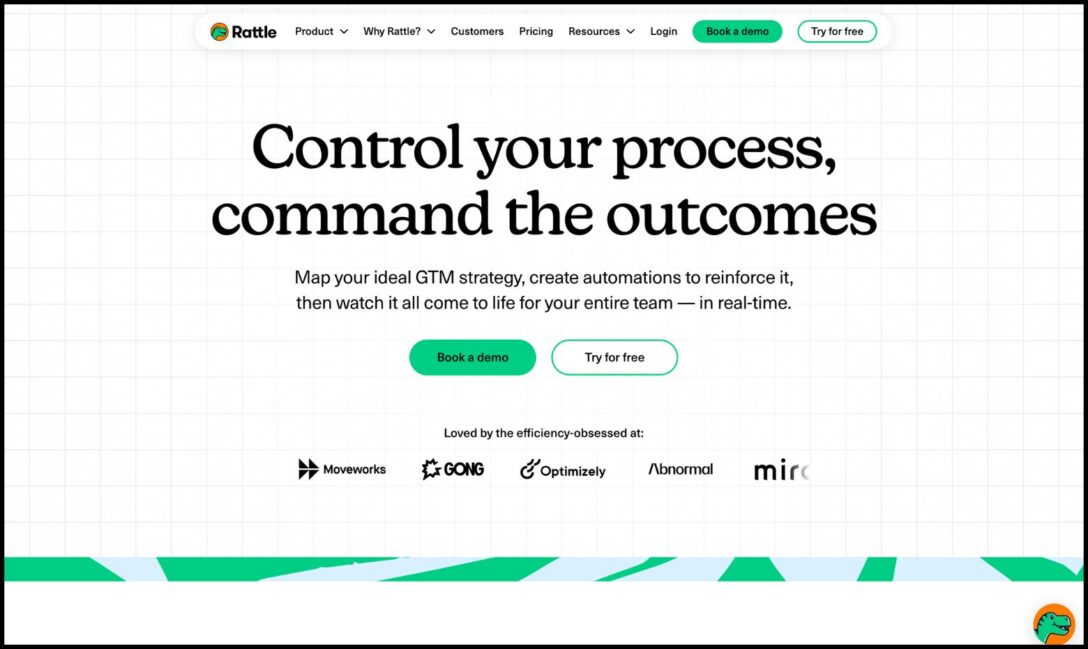
Main Features
- Automated workflows between sales tech and Slack/Teams
- Automated alerts
- Salesforce reports delivered to Slack or Teams
- Collaborative Deal Rooms in Slack
- Meeting intelligence
- Content suggestions
Rattle Pricing
Rattle has three plans: Starter ($19/user/month), Pro ($34/user/month), and Premium ($49/user/month). Specific details and comparisons can be found on the Rattle G2 pricing page. Additionally, Rattle offers an all-access, 21-day free trial.
Pros
Rattle has 90+ reviews on G2 with an average 4.8 rating. Users report that Rattle keeps Salesforce up-to-date and helps automate “mundane” tasks. Many users find that Rattle helps them work faster and more efficiently.
Cons
Negative reviews for Rattle mention that the tool can create a “noisy” Slack environment. In addition, some users find that error alerts don’t contain enough context.
#5 SalesIntel
SalesIntel is a sales intelligence tool that provides B2B contact data like email addresses, phone numbers, and intent data. SalesIntel helps users reach out to leads more efficiently by identifying ideal customers and surfacing accounts in-market.
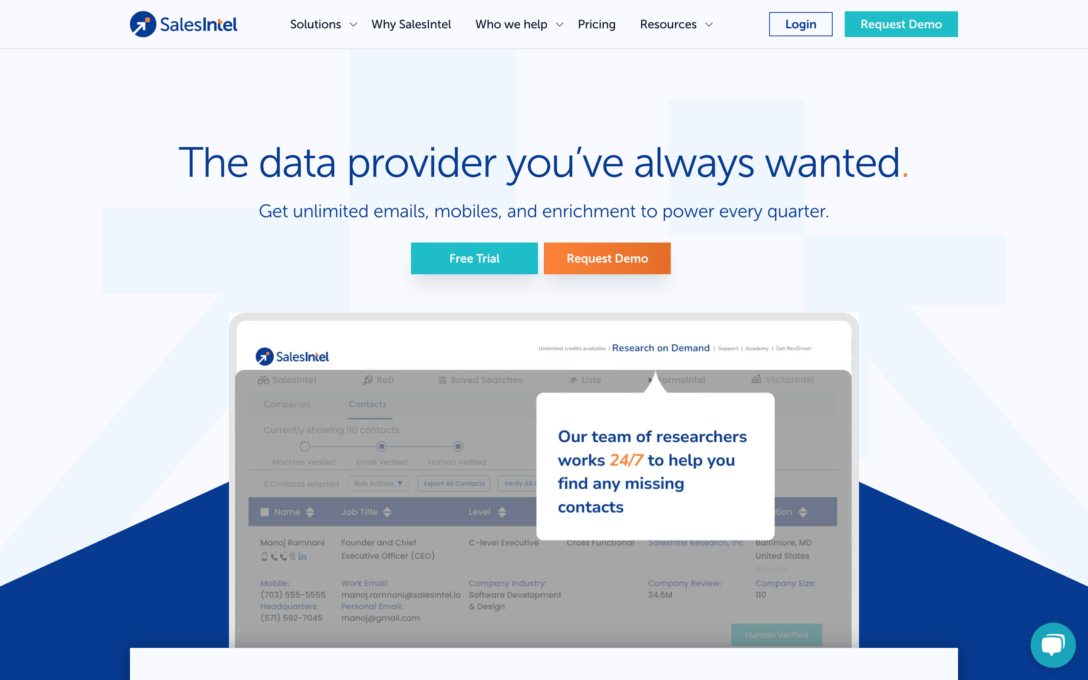
Main Features
- Account firmographics
- Emails and mobile numbers
- Research on demand
- At scale Personalization
- CRM and marketing automation integrations
- Sales engagement integrations
- Chrome extension prospecting tool
SalesIntel Pricing
SalesIntel has three pricing tiers: Individual ($69/month), Teams ($199/user/month, billed annually, up to 5 users), and Professional (custom pricing for 5+ users). Specific details and comparisons can be found on the SalesIntel Pricing Page. Additionally, SalesIntel offers a risk-free, 14-day free trial.
Pros
SalesIntel has 330+ reviews on G2 with an average 4.3 rating. Overall, users report the platform is easy to use and navigate. They also praise the customer support team for their turnaround time, responsiveness, and helpfulness.
Cons
Negative reviews of SalesIntel criticize the accuracy of information. Users located outside of the US also point out how the platform is mostly US/UK-centric.

#6 Clearbit
Clearbit is a HubSpot-native data enrichment tool that helps manage sales records. Similar to SalesIntel, Clearbit provides companies with B2B business data and intent data which helps identify potential customers faster.
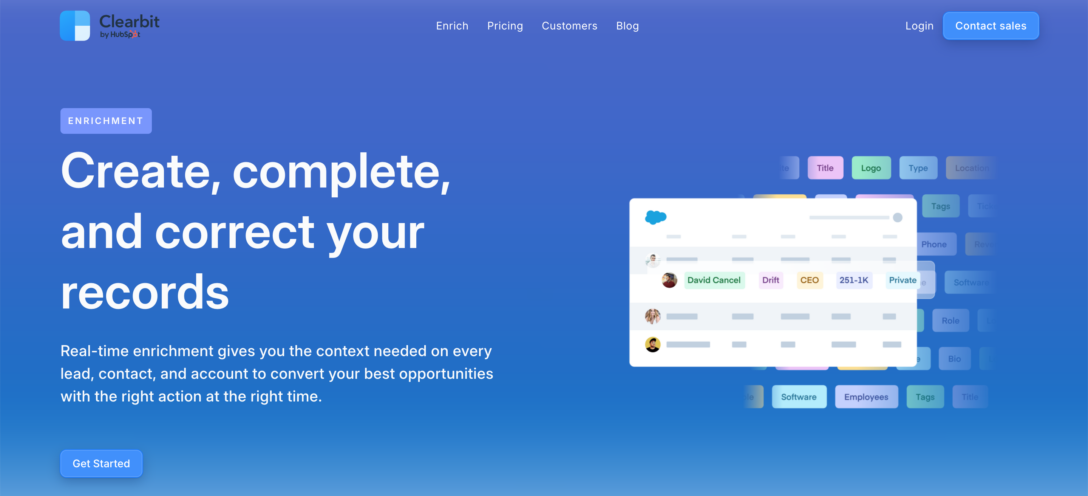
Main Features
- Contact, company, and industry data
- Data cleaning
- Integration with Salesforce, Hubspot, and Slack
Clearbit Pricing
Clearbit has no ungated pricing information included on their website. For specific details, buyers need to provide contact information.
Pros
Clearbit has 600+ reviews on G2 with an average 4.4 rating. Users report the UI is simple and easy. Users also appreciate how information automatically updates. Clearbit customer support also receives positive reviews.
Cons
Critical reviews of Clearbit mention inaccurate or duplicate data. This creates more work for users to validate the data. Additionally, small business users comment on the high price point.
#7 Salesforce Sales Cloud
Salesforce Sales Cloud is a suite of tools within the Salesforce CRM ecosystem. It is an AI-powered sales solution that uses automation and other features to help teams maximize productivity. Sales Cloud helps with speed to lead primarily through automated lead distribution and scoring.
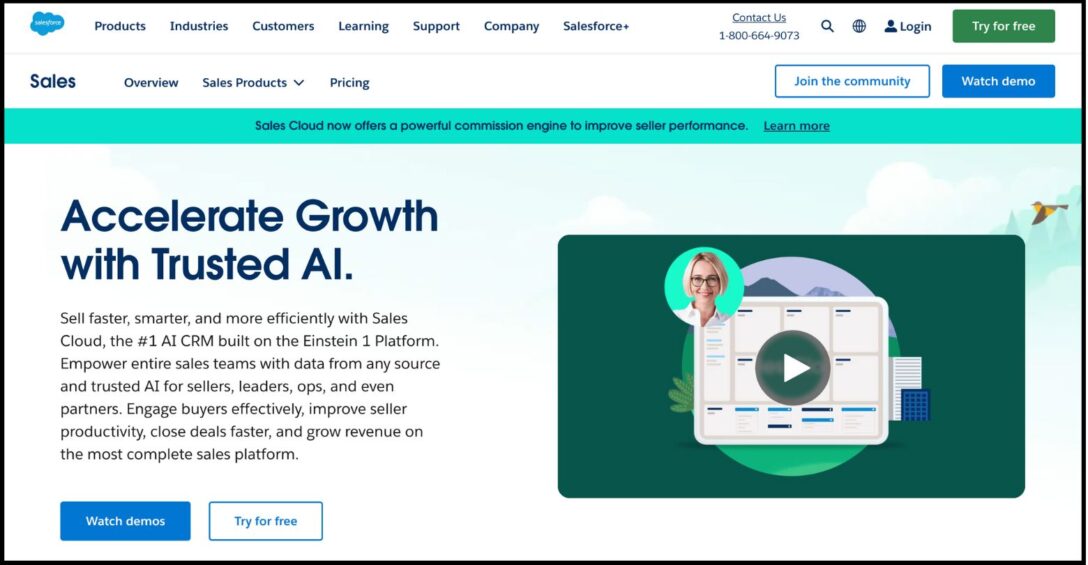
Main Features
- Lead, Contact and Account management
- Sales analytics
- Pipeline management
- (Workflow) automation
- Email integration
- Sales forecasting
- Sales performance management
- Partner relationship Management
- Sales team productivity tools
Salesforce Sales Cloud Pricing
Salesforce Sales Cloud has five plans: Starter Suite ($25/user/month), Professional ($80/user/month), Enterprise ($165/user/month), Unlimited ($330/user/month), and Einstein 1 Sales ($500/user/month).
All plans are billed annually except for Starter Suite, which can be billed either annually or monthly. Excluding Einstein 1 Sales, all plans offer a 30-day free trial as well. Specific details and comparisons for each plan are located on the Salesforce website.
Pros
Sales Cloud has 19K+ reviews on G2 with an average 4.3 rating. Sales Cloud users note how stable and reliable the platform is, and appreciate its customizability. In addition, Sales Cloud integrates with thousands of applications on the Salesforce Appexchange including LeanData.
Cons
Negative reviews of Sales Cloud mention expensive pricing and the high cost of add-on features. In addition, users complain there’s a significant learning curve in using the platform. Last, users comment that to tap into the full potential of the platform, the features require customization.
#8 Outreach
Outreach is a sales engagement tool that helps sales teams manage their interactions with prospects by organizing information and automating tasks. Moreover, the platform supports speed to lead through automated email sequences, scoring algorithms, and predictive analytics. Accordingly, Outreach will rank leads based on their likelihood to convert.
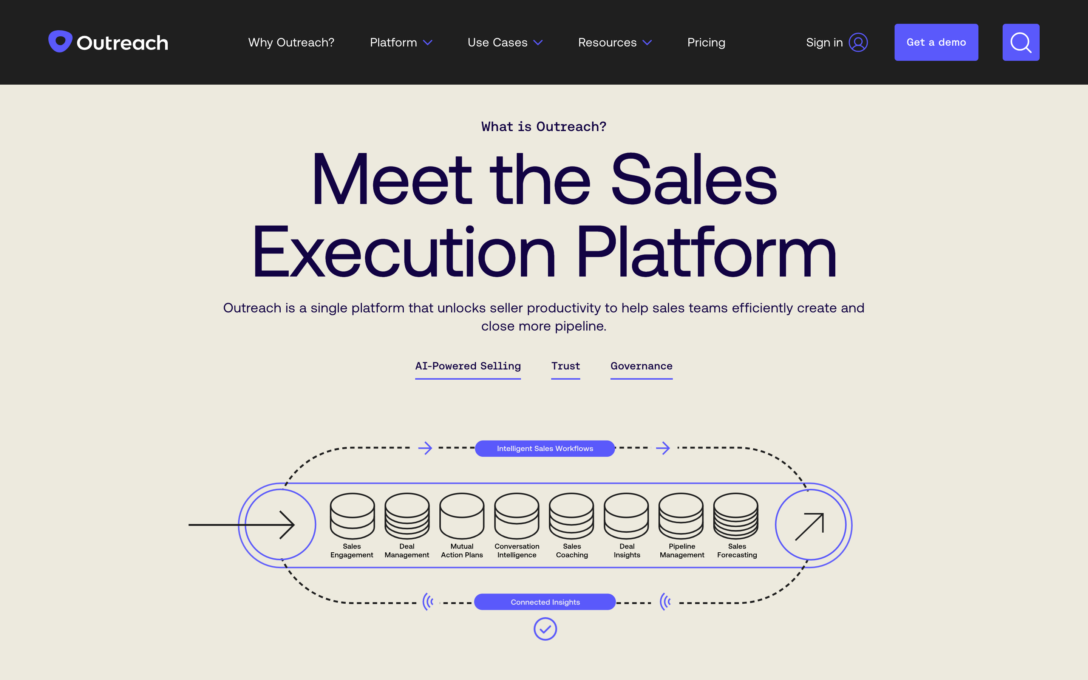
Main Features
- Automated email sequences
- Conversation intelligence
- Deal health scores
- Sales rep coaching
- Salesforce integration
- Meeting scheduler
Outreach Pricing
Outreach offers five pricing tiers, however, they have no ungated pricing information. Specific package details and sales rep contact information is available on their website.
Pros
Outreach has 3K+ reviews on G2 with an average 4.3 rating. Outreach users compliment its sequencing, prospecting, and tracking capabilities. They like how it helps them prioritize their workday and be more productive.
Cons
Critical reviews mention issues with the Salesforce integration. In addition, some users would like more robust reporting features. Other reviews mention technical glitches and system lags.






